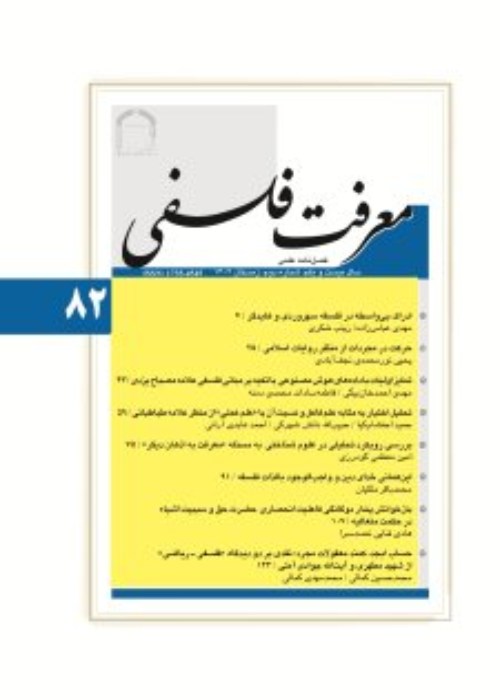فهرست مطالب

فصلنامه معرفت فلسفی
سال دوم شماره 4 (پیاپی 8، تابستان 1384)
- 160 صفحه، بهای روی جلد: 3,000ريال
- تاریخ انتشار: 1384/07/30
- تعداد عناوین: 8
-
صفحه 7
-
میزگردفلسفه شناسی / رابطه فلسفه و عرفان / با حضور آقایان دکتر یحیی یثربی، دکتر محمد فنایی اشکوری، حجت الاسلام حسین عشاقیصفحه 11از دیرباز گرایش به عرفان و معنویت در میان ملل مختلف رواج داشته است؛ گاه به صورت سنت عرفانی و گاه به صورت یک گرایش فردی. در این زمینه می توان از سنت های کهن شرقی مانند هندوئیسم، بودیسم، سنت عرفانی مسیحی و اسلامی یاد کرد. امروزه نیز همچون گذشته در محافل اسلامی و حوزه های علمیه، هم فلسفه یکی از موضوعات مورد علاقه اندیشمندان است و هم عرفان از موضوعات پرطرفدار. اما فلسفه عرفان از موضوعات ناب روزگار ماست. فلسفه عرفان حاوی تاملات عقلی درباره عرفان است. فیلسوف عرفان را از بیرون نگاه نموده و درباره حقیقت، مبادی، روش ها و نسبت عرفان با دیگر امور بحث می کند. بحث از چیستی عرفان، مقدار اعتبار و ارزش معرفت شناختی یافته های عرفانی، تفاوت تجربه و تعبیر، نسبت عرفان و عقل، زبان عرفانی، و رابطه عرفان با دین و اخلاق از موضوعات مورد بحث در این گفت وگو است.
کلیدواژگان: فلسفه عرفان، چیستی عرفان، زبان عرفانی، عرفان نظری و عرفان بدون خدا -
صفحه 39تجربه عرفانی به دلیل ژرفا و پیچیدگی مشهودات خود، پرسش هایی را فراروی فیلسوفانی که در وادی فلسفه عرفان گام نهاده اند، برانگیخته است. یکی از این پرسش ها، پارادوکسیکال بودن آموزه های عرفانی، همچون وحدت شخصیه وجود، است. عارفان گاه می گویند حقیقت هستی هم عین اشیاست و هم غیر آن. گاه از مشهودات خود چنین تعبیر می کنند: او هم واحد است و هم در دل کثیر حاضر بوده و کثیر است؛ هم متشخص است و هم نامتشخص؛ دلبر حقیقی در عین ظهور، باطن و در عین بطون، ظاهر است.
پرسش این است که آیا این احکام برآمده از شهود عارف، به راستی متناقض اند، یا ظاهری تناقض آمیز دارند و در ذات آن ها تناقضی وجود ندارد. اگر چنین تناقضی در ذات حقایق عرفانی و به ویژه وحدت شخصیه نهفته باشد، ناگزیر این آموزه ها با عقل سازگار نخواهند بود؛ زیرا بنیاد عقل با اصل عدم تناقض و اصل این همانی سامان می یابد. در این صورت، عقل نمی تواند در حوزه عرفان و حقایق خارجی آن گام نهاده، آنها را به نیکی بفهمد، و بر آنها استدلال کند. بنابراین، پرسش این است که آیا عرفان با عقل و فلسفه سازگار است؟ و به طور کلی عرفان عقل گریز است یا عقل پذیر؟
و.ت. استیس در فصل پنجم کتاب عرفان و فلسفه به این موضوع پرداخته است. این مقاله می کوشد تا دیدگاه آقای استیس را تحلیل، نقد و بررسی کند.
کلیدواژگان: تجربه عرفانی، وحدت شخصیه، حقیقت هستی، این همانی، امتناع اجتماعی نقیضین، ساحت نامتناهی، احکام اطلاقی -
صفحه 67مدعای اصلی این مقاله رد قول به اعتباریت ماهیت است. از همین روی، نویسنده تلاش نموده تا ادله اعتباریت ماهیت را نقد و بررسی کند. نکته مهمی که در این مقاله بر آن تاکید شده این است که بسیاری از ادله ای که در این زمینه ارائه شده، در حقیقت ناظر به اصالت وجود است نه اعتباریت ماهیت؛ در حالی که میان این دو ملازمه ای در کار نیست.
پذیرش اصالت وجود به معنای تن دادن به اعتباریت ماهیت نیست. بنابراین دورانی که در کلمات برخی بزرگان مشاهده می شود، که یا باید اصالت وجودی شد و یا اصالت ماهوی، از نظر منطقی موجه نیست.
کلیدواژگان: وجود، ماهیت، اصالت، اعتباریت -
صفحه 87بنیادی ترین مسئله در حوزه معرفت شناسی دینی، که دشوارترین آن ها نیز هست، معیار صدق گزاره های ظنی و جزمی دین است. از منظر ما برای معرفت به دین، جزم و علم متعارف و اطمینان کفایت می کند. بر اساس این نگرش، یعنی کفایت علم متعارف یا جزم، معیار صدق این گونه معرفت ها چیست؟ در پاسخ به این مسئله، چندین معیار برای ارزیابی معرفت های اطمینانی یا جزمی می توان برشمرد. در این مقال، هر یک از راه حل های مزبور را بررسی کرده ایم، که مهم ترین آن ها دکترین حجیت در معرفت شناسی دینی و راهبرد شهید صدر در حل مسئله استقراست.
این راه حل ها در صورتی قابل استنادند که نتوانیم گزاره های ظنی، جزمی و یقینی بالمعنی الاعم دین را بر گزاره های یقینی بالمعنی الاخص مبتنی بدانیم. اما اگر بتوانیم آن معرفت ها و گزاره ها را بر گزاره های یقینی بالمعنی الاخص مبتنی بدانیم، نیازی به آن راه حل ها نیست. از نظر ما چنین ابتنایی ممکن است.
کلیدواژگان: اعتبار ذاتی یقین، گزاره های تعبدی و غیر تعبدی، یقین ذاتی و موضوعی، آموزه حجیت، احتمال تحدی -
صفحه 109اصل امتناع تناقض به دلیل اهمیت و جایگاهش، از جنبه های مختلفی قابل بررسی است، و مباحث مربوط به این اصل را می توان به طور خاص در سه حوزه معرفت شناسی، فلسفه و منطق پی جست. البته نمی توان بین جنبه های معرفت شناختی، فلسفی و منطقی این اصل مرز قاطعی ترسیم کرد، و این سه جنبه پیوند بسیار نزدیکی با یکدیگر دارند. با این همه، برخی از مباحثی که درباره این اصل طرح شده است صرفآ به یکی از سه جنبه فوق باز می گردد، و به همین دلیل، توجه به تمایزی که این سه جنبه با یکدیگر دارند در فهم احکام و فروع این اصل راهگشا خواهد بود. در این نوشتار خواهیم کوشید تا تبیین های این اصل و احکام و فروع آن را با توجه به سه جنبه معرفت شناختی، فلسفی و منطقی آن بازخوانی کنیم.
کلیدواژگان: اصل تناقض، بدیهیات، مبنا گرایی، دلیل تسلسل، تقابل -
صفحه 141بحث از قیاس اقترانی و به اصطلاح اشکال اربعه، همواره از مباحث پرجاذبه است. ارسطو قیاس های اقترانی را سه شکل در نظر گرفت، ولی جالینوس و یا پیش از او فرد دیگری، شکل چهارم را بر این مجموعه سه شکلی افزود. نویسنده در این مقاله تلاش کرده تا نشان دهد که یا باید به سه شکل ملتزم شد و از بعضی از لوازم آن مانند شرایط انتاج شکل اول دست شست، و یا به شش شکل پای بند بود و شکل پنجم و ششم را هم پذیرفت.
کلیدواژگان: قیاس اقترانی، حد وسط، اشکال اربعه، ارسطو، جالینوس، ابن سینا، فارابی
-
Page 7
-
Page 11There has been always a propensity towards mysticism and spirituality among different nations, whether in the form of mystical traditions or individual tendencies. As an example, one can mention such ancient Eastern traditions as Hindu, Buddhist, Christian, and Muslim mystical traditions. Both philosophy and mysticism are nowadays, as ever, among favorite and popular subjects in Islamic circles and seminaries. The philosophy of mysticism, however, is an unattained subject in modern times, consisting of rational reflections on mysticism. A philosopher studies mysticism from without, exploring its reality, rudiments, methodology, and its relations with other disciplines. The present discussion covers such issues as the nature of mysticism, the validity and epistemological value of mystical findings, the problem of mystical language, the difference between an experience and its interpretation, and the relation between mysticism and reason, religion, and ethics.
-
Page 39On account of the depth and complexity of its intuitions, mystical experience raises some questions for philosophers entering the province of the philosophy of mysticism; questions like the paradoxicality of such mystical doctrines as personal unity. Mystics sometimes speak of the facticity of existence as being both identical with and different from things. In some occasions, they express their intuitions as revealing that He (God) is both singular and plural by being present in the midst of plurality. He is both personal and impersonal, united with everything, and even He is everything, manifest while hidden and hidden while manifest. Are these statements that originate from mystical intuitions, really contradictory, or they only appear to be so? If there are contradictions lurking in the essence of mystical realities, they will not be commensurable with rational laws, because reason is based on the principles of identity and non-contradiction; therefore, reason will not be able to penetrate mysticism, understand its objective realities, and argue for them. Thus the question is whether or not mysticism is compatible with reason and philosophy, and in general, whether mysticism is rational or irrational? W.T. Stace has treated this problem in Mysticism and Philosophy, chapter five. This article tries to elaborate, compare, and scrutinize Stace’s points of view in this regard.
-
Page 67The existence of the Absolutely Perfect, or the Infinite Being, is one of the fundamental convictions of all monotheists, especially Muslims. Such terms as Subˆān-Allah, al-ˆamd-u li-llāh, yā Subbūˆ, and yā Quddūs refer to the reality of God as the absolutely perfect. In order to establish such a fundamental conviction, religious (including Muslim) philosophers, have introduced rational arguments and philosophical reasons, which are critically reviewed in this paper. The author also introduces other arguments that have not been sufficiently articulated in the existing philosophical works.
-
Page 87In the discussion about the necessary and sufficient knowledge in religion, three important questions are raised in the Islamic epistemology: first of all, which type of knowledge can be achieved regarding the Islamic teachings? Is it possible to achieve certainty in its narrowest sense in religious matters? Secondly, given the possibility of such knowledge is it necessary to acquire it, or it is sufficient to have a guess, an ordinary type of knowledge, or conviction? Thirdly, if an ordinary knowledge or confidence were sufficient, what are the criteria for its validity? Providing definitions for the terms “religion” and “epistemology” and their applications, and dividing certainty into common, specific, and the most specific one, the article argues that achieving the most specific certainty, is possible in some areas of religion, though acquiring such knowledge is not necessary. The views of some Muslim scholars, namely, Ayatullahs Qā„i _abā¬abā’i, Mīrzā-yi Qumi and Ma´āheri, as the only ones explicitly dealing with the issue, are discussed. The author criticizes Qā„i _abā¬abā’i’s view that achieving the most specific certainty is necessary regarding the basic beliefs of Islam. Although others have not clearly addressed this issue, there are evidences in their writings pointing to the idea that achieving the most specific certainty is not necessary in matters of religion.
-
Page 141Peripatetic Philosophers believe that sensory perception is the result of the imprint of external objects in sense organs. Regarding vision, two views have been put forward: a) the flow of light, and b) the imprint of a visual image in the eye. Suhrawardi repudiates the idea of the flow of light, as he rejects the theory of imprint arguing that major cannot be imprinted in minor. Hence, he believes that it is through knowledge by presence that external objects can be seen. Rejecting Suhrawardi’s view, uadr al-Muta’allihīn suggests that in all types of sense perceptions, an object is perceived when the soul (nafs) creates its sensual image in the associated world of forms, that is, the object of visual perception is itself a material being. However, one can claim that on the basis of the principles of transcendental philosophy, sense perception should be considered as a type of knowledge by presence, and the immateriality of the object of knowledge—because of the immateriality of knowledge and its subject—does not contradict its being material, because the division of beings into material and immaterial, as its division into objective and subjective, is a relational division.
-
Page 157


